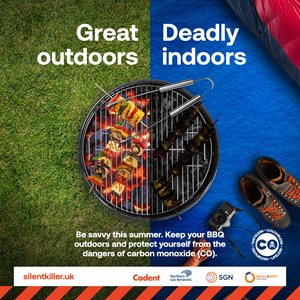The danger of carbon monoxide (CO) poisoning is often associated with the winter months, but you can be at risk any time of year, even in the heart of summer. Make sure you know the symptoms of carbon monoxide poisoning.
Known as the silent killer, carbon monoxide is a colourless, odourless, tasteless, poisonous gas produced by the incomplete burning of carbon-based fuels, including gas, oil, wood and coal. You can find out more about carbon monoxide and the dangers here
Carbon monoxide doesn't just pose a danger in the home. There are an increasing number of carbon monoxide related incidents that happen outside the home. Vehicles, including boats, produce carbon monoxide and fuel-burning equipment such as camping stoves, camping heaters, lanterns, charcoal grills and disposable barbecues are also sources of carbon monoxide.
So if you're planning a BBQ or going away this summer, whether you're camping and caravanning, staying in a hotel or cottage or going abroad, you are at risk of carbon monoxide poisoning.
-v1.jpg?width=300&height=300)
BBQs produce carbon monoxide even when they are working well and can continue to give off deadly carbon monoxide for hours after being extinguished.
Whether you are having a BBQ at home or on holiday it is essential to take care and make sure they are only used in properly ventilated area.
BBQ carbon monoxide safety tips
If you are using an LPG BBQ, you should also:
-STATIC-v2.jpg?width=300&height=300)
Over the summer many of us will be heading off on holiday. There is a chance you might be exposed to carbon monoxide when you are away, whether you’re camping, staying in a cottage, villa, caravan or in a luxury resort you could be at risk of carbon monoxide poisoning in the UK and abroad.
Know the dangers
When camping, caravanning or boating, despite being out in the fresh air, carbon monoxide can build up to levels that can kill very quickly in enclosed spaces, such as tents and awnings. Boilers in hotels or holiday accommodation could be faulty or poorly maintained so could emit carbon monoxide.
Carbon monoxide poisoning can occur on boats when emissions from gas-powered engines and generators build up in boat cabins. It's important to make sure they are kept in good condition, checked regularly and areas are well ventilated.
Holiday safety tips
If you are on holiday and your CO alarm sounds
Your gas boiler will be working even if your heating is off and faulty appliances can release carbon monoxide. Get your gas appliances checked by a Gas Safe Registered engineer every year.
As carbon monoxide is an odourless gas, it can be difficult to identify the signs of carbon monoxide poisoning. Installing a carbon monoxide alarm is one way to ensure you’re always alerted to the presence of carbon monoxide, however it’s also important to recognise the most common symptoms of carbon monoxide poisoning.
The symptoms of carbon monoxide poisoning are often mistaken for other illnesses, such as food poisoning or flu and include:
Anyone who suspects they are suffering from carbon monoxide poisoning should immediately go outside into the fresh air and seek urgent medical attention.